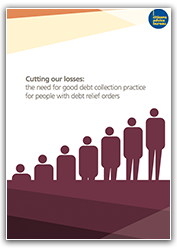Cutting our losses:the need for good debt collection practice for people with debt relief orders

The introduction of debt relief orders (DROs) in 2009 increased the number of people in England and Wales able to afford access to formal relief from unmanageable debts. DROs are much cheaper than bankruptcy and enable people on the lowest incomes and with no assets to get their debts written off if they meet strict criteria.
The CAB service plays a crucial role in making DROs accessible to debtors on low incomes – over half the DRO applications last year were made by a CAB adviser. Through this work we have gained a great deal of knowledge about how DROs work and how clients’ experience of a DRO can be profoundly affected by the behaviours of creditors – for better and for worse.
This report seeks to persuade all creditors and debt collectors to take a more positive approach to DROs, so that our clients who want to obtain a DRO or who have already been awarded one can obtain a fresh start.
Better and swifter information sharing is needed so that our advisers can submit DRO applications as quickly as possible. A survey of CAB advisers involved in helping clients obtain debt relief orders found that 80 per cent had experienced problems getting information from some creditors.
Once a DRO has been awarded, we need companies to take prompt action to prevent debt collection and to support their customers by maintaining essential services and supporting the principle of debt relief. Advisers regularly report cases of debts listed in a DRO being pursued by creditors, which often causes great distress.
But some companies do the right thing – this report contains many examples of good practice by creditors and debt collectors of all kinds. These examples have inspired five principles of good practice which we think all creditors and debt collectors should adopt to ensure that people in debt get the debt relief that the law intended.

